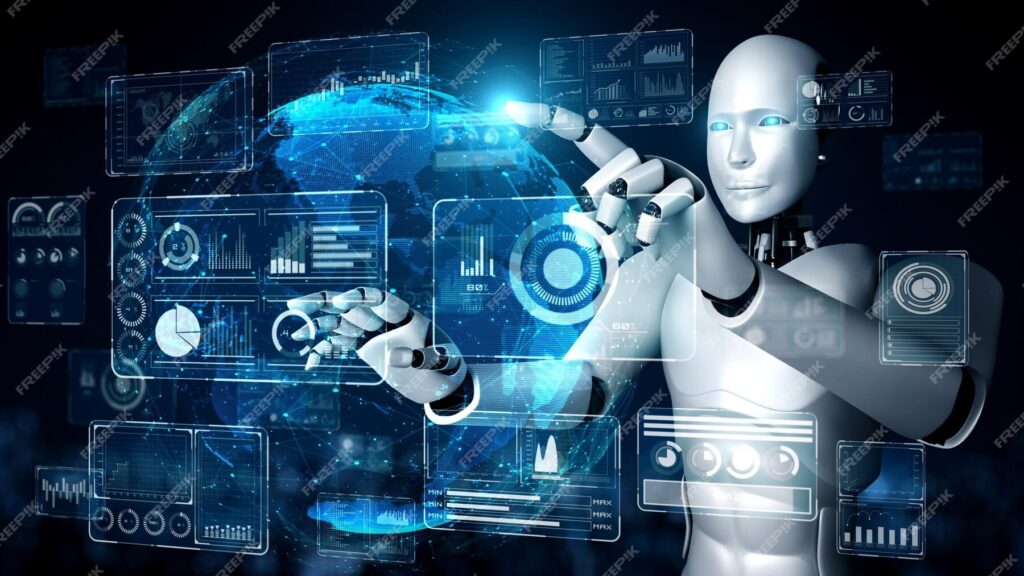
Artificial Intelligence (AI) has emerged as a transformative force across various sectors, revolutionizing how we live, work, and interact. From automating mundane tasks to enhancing decision-making processes, AI’s capabilities are vast and continually expanding. As a Certified Agentic AI Expert™ and Certified Agentic AI Developer™, I have witnessed firsthand the profound impact AI has on modern society.
1. Automation of Repetitive Tasks
One of AI’s most significant advantages is its ability to automate repetitive and time-consuming tasks. In industries like manufacturing, AI-powered robots handle assembly lines with precision and efficiency, reducing human error and increasing productivity. In the corporate world, AI automates data entry, scheduling, and customer service interactions, allowing employees to focus on more strategic initiatives. This automation not only enhances operational efficiency but also leads to cost savings and improved accuracy.
2. Enhanced Decision-Making
AI systems excel at analyzing vast amounts of data to provide actionable insights, aiding in informed decision-making. In healthcare, AI algorithms assist in diagnosing diseases by analyzing medical images and patient records, leading to early detection and personalized treatment plans. In finance, AI models predict market trends, assess risks, and optimize investment strategies. By processing data at unprecedented speeds, AI enables organizations to make swift and accurate decisions, giving them a competitive edge.
3. Improved Customer Experiences
AI enhances customer experiences by providing personalized and efficient services. Chatbots and virtual assistants, powered by natural language processing, handle customer inquiries 24/7, offering instant support and resolving issues promptly. Recommendation systems, like those used by Netflix and Amazon, analyze user behavior to suggest products or content tailored to individual preferences. These AI-driven interactions not only increase customer satisfaction but also foster brand loyalty.
4. Advancements in Healthcare
The integration of AI in healthcare has led to significant advancements in patient care and medical research. AI algorithms analyze complex medical data to identify patterns and predict health outcomes. For instance, AI models can detect anomalies in radiology images, aiding in early diagnosis of conditions like cancer. Additionally, AI facilitates drug discovery by simulating how different compounds interact with biological systems, accelerating the development of new medications.
5. Boosting Educational Outcomes
AI is transforming education by offering personalized learning experiences. Adaptive learning platforms assess students’ strengths and weaknesses, tailoring content to meet individual needs. AI-powered tools provide instant feedback, helping students grasp concepts more effectively. Moreover, educators utilize AI to automate administrative tasks, such as grading and attendance tracking, allowing them to dedicate more time to instruction and student engagement.
6. Strengthening Cybersecurity
In the realm of cybersecurity, AI plays a crucial role in detecting and mitigating threats. AI systems monitor network traffic to identify unusual patterns indicative of cyberattacks. Machine learning models adapt to evolving threats, enhancing the ability to prevent data breaches and unauthorized access. By automating threat detection and response, AI fortifies digital infrastructures against malicious activities.
7. Environmental Conservation
AI contributes to environmental conservation efforts by analyzing data related to climate change, deforestation, and wildlife populations. For example, AI models predict weather patterns, aiding in disaster preparedness and resource management. In agriculture, AI optimizes irrigation and fertilization processes, promoting sustainable farming practices. These applications of AI support global initiatives aimed at preserving natural ecosystems.
8. Enhancing Transportation Systems
The transportation industry benefits from AI through improved safety and efficiency. Autonomous vehicles utilize AI to navigate roads, interpret traffic signals, and avoid obstacles, reducing the likelihood of accidents. AI also optimizes traffic flow in urban areas by analyzing real-time data, decreasing congestion and commute times. Furthermore, logistics companies employ AI to streamline supply chain operations, ensuring timely deliveries and reducing costs.
9. Facilitating Financial Services
AI revolutionizes financial services by automating processes and enhancing risk assessment. Banks and financial institutions use AI for fraud detection, analyzing transaction patterns to identify suspicious activities. AI-driven credit scoring models evaluate loan applicants more accurately, promoting fair lending practices. Additionally, robo-advisors provide personalized investment advice, making financial planning more accessible to a broader audience.
10. Accelerating Scientific Research
In scientific research, AI accelerates discoveries by processing and interpreting complex datasets. Researchers employ AI to model molecular structures, predict chemical reactions, and simulate experiments, expediting the development of new materials and drugs. AI also aids in analyzing astronomical data, contributing to our understanding of the universe. By handling data-intensive tasks, AI enables scientists to focus on hypothesis generation and experimental design.
Conclusion
The advantages of artificial intelligence are vast and multifaceted, permeating nearly every aspect of modern life. As a Certified Agentic AI Expert™ and Certified Agentic AI Developer™, I recognize the transformative potential of AI in driving innovation, efficiency, and societal progress. While embracing AI’s benefits, it is imperative to address ethical considerations, ensure data privacy, and promote equitable access to AI technologies. By doing so, we can harness AI’s capabilities to create a more prosperous and inclusive future.






